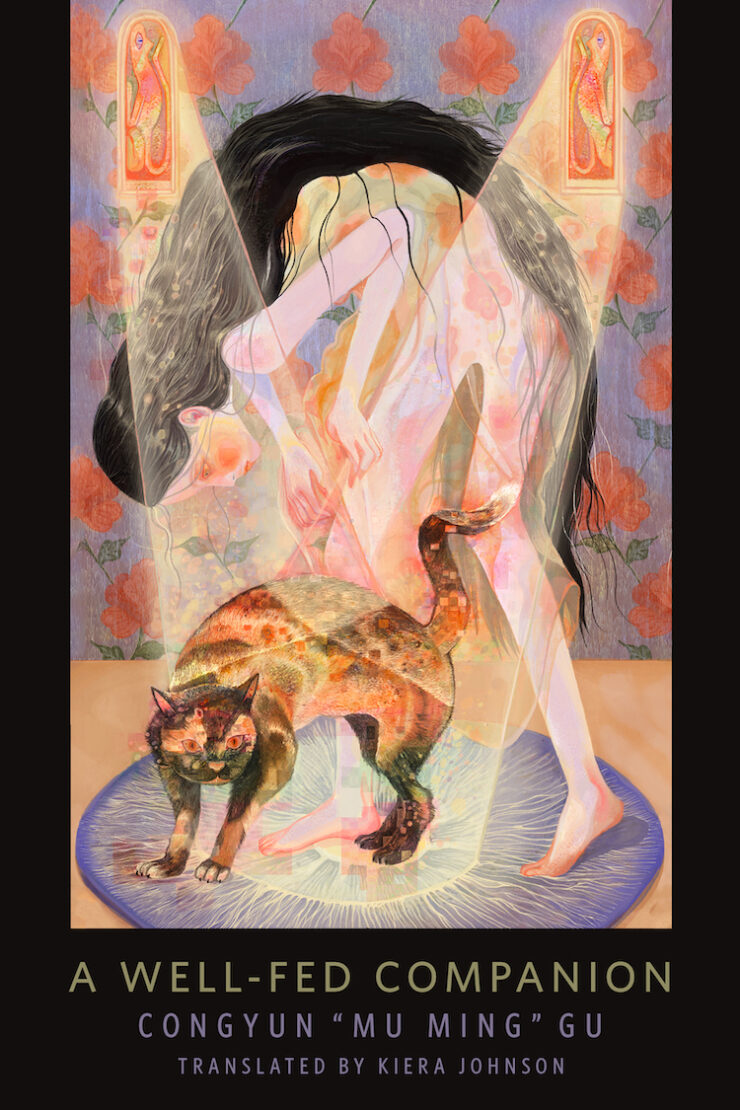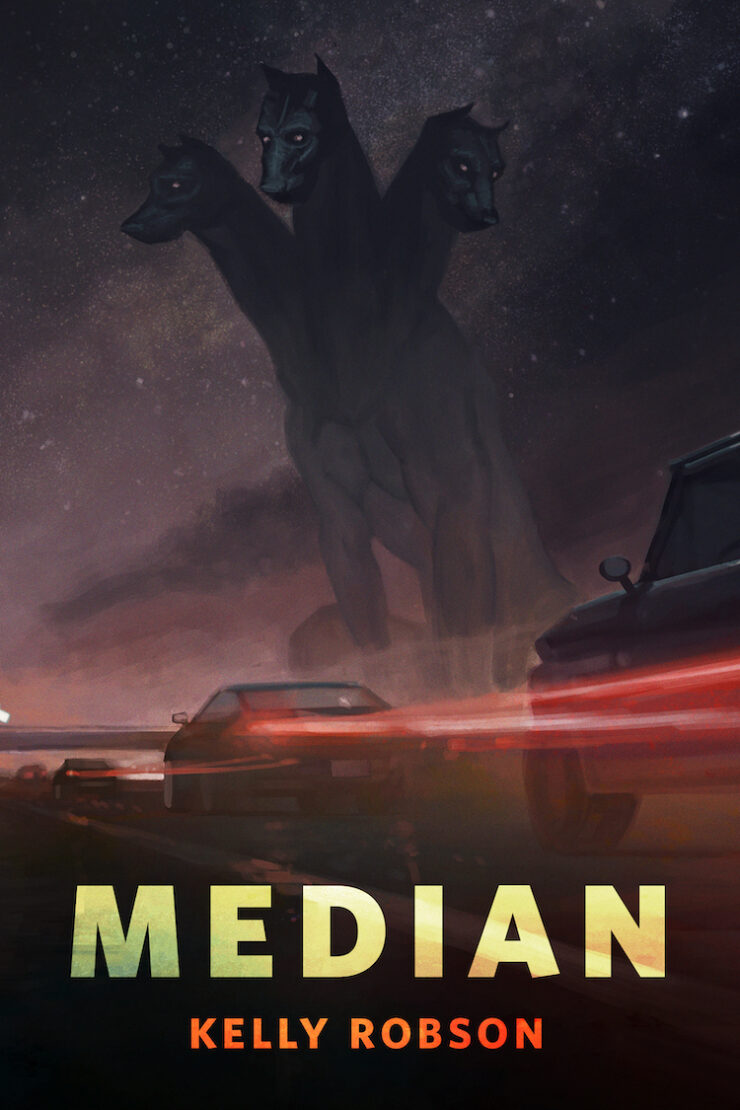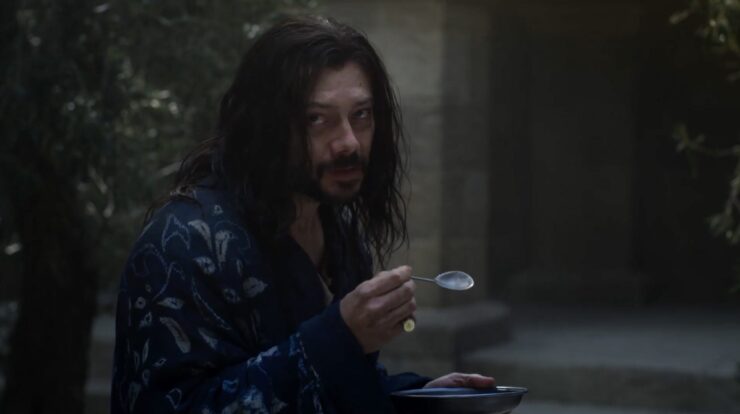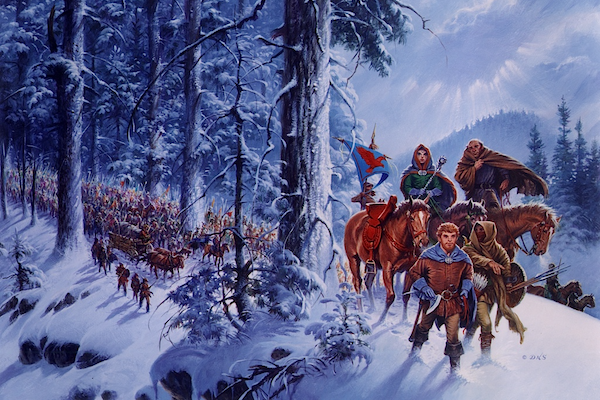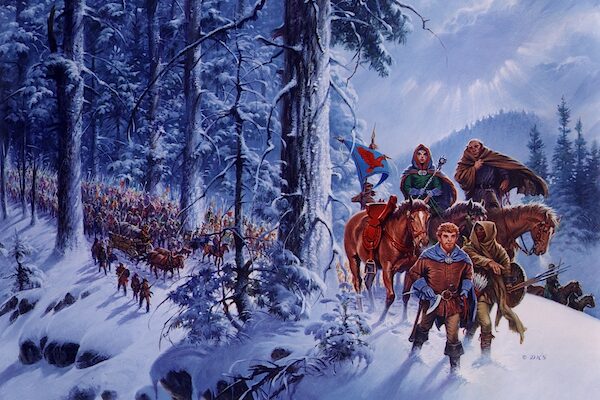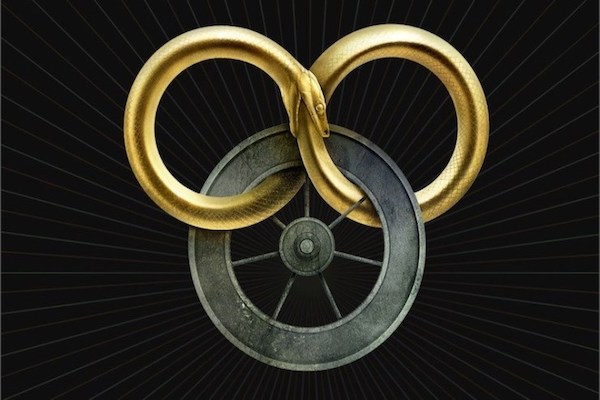My soul is black with blood, and damned. It was not a hard thought, not biting or edged; a simple statement of fact. “A mercy any man might wish for, Torval.”
—Rand al’Thor, The Path of Daggers
We first learned that Mazrim Taim is performing mercy killings of Black Tower recruits in chapter 14 of The Path of Daggers. In this section, Peral Torval arrived with a letter for Rand from Mazrim Taim regarding the recruiting and loss numbers in the Black Tower. Torval also revealed, mostly in an attempt to unnerve Eben Hopwil and Jahar Narishma, that Taim was poisoning the wine of the men who went mad, causing them to pass away quietly in their sleep. At the time, I didn’t give much thought to the matter, mostly because there were a lot of other things to think about in that section, like the fact that Taim seems to be passing down his hatred of Rand to the men he’s training, or the way that Rand had to fight the urge to murder Torval. Plus, at the end of the chapter, Fedwin arrived to report the Seanchan advance and the strangeness of saidin around Ebou Dar. Rand’s attention turned to the Seanchan threat at once, and so did mine, as I also wondered what effects the Bowl of the Winds was having on the One Power.
But after Fedwin’s death at the end of The Path of Daggers, it felt worth revisiting the ever-looming danger of taint madness, and what that cup of sleep really means, both for the story at large, and for Rand personally.
Of course, the other reason I didn’t pay that much attention to the whole poison-cup-mercy-killing thing is because the story itself hasn’t paid much attention to it. In general, the doings of the Asha’man—including what Taim’s getting up to and the death/burn out/desertion rate among trainees—has mostly been going on in the background. I can understand why Rand felt like he needed to entrust the recruiting and training of the Black Tower to Taim—Rand always has too much to do and not enough time to do it, and Taim was the only other channeler capable of training the recruits. However, it’s significant that Rand—who has trust issues even with the people closest to him—is barely even checking up on Taim, as “the M’Hael” rapidly trains an entire army of powerful, dangerous male channelers.
I can’t help but think that part of Rand’s choice not to monitor the training or come by the Black Tower to check up on Taim is because he doesn’t really want to face the truth of the Asha’man. He hates and despise Taim, and of course he has Lews Therin in his mind all the time trying to get him to murder any man who can channel as soon as that man steps into Rand’s vicinity. But more than that, I think Rand is avoiding thinking about the fate he has condemned these men to. After all, he knew better than anyone what fate he was signing men up for when he declared his amnesty and offered training to any man who wanted to see if he could learn. This would have been a great gift to men born with the spark, of course, some of whom might have died from touching the source even before they had time to go mad from the taint, and the rest of whom faced the inevitable gentling and resulting despair and death. For them, the chance to learn and serve was the best possible outcome, even with the threat of the taint. But for the rest, Rand’s decision to found the Black Tower offered them a life, and a very dark fate, that they otherwise never would have faced.
Many of the men who came to the Black Tower would never have touched the source, never have been exposed to the taint, if Rand hadn’t created to opportunity for them to be tested. Some of them, like Hopwil and Fedwin, were barely more than children when they came to the Black Tower. By offering the testing and training, and by setting Taim to do active recruiting, Rand is directly responsible for the lives these men now lead. He’s also responsible for the deaths in training, since it was he who decided on the pace, and he’s also responsible for the fact that many of these men have come to think of themselves as little more than sentient weapons—that is, after all, how Rand chooses to think of them most of the time.
Buy the Book


Under the Smokestrewn Sky
I really wish we had a main character besides Rand who was a channeler of saidin. We see so many different reasons that women want to go to the White Tower, and I want that same understanding of the reasons that men might want to learn to channel. After all, becoming an Aes Sedai carries a long history, the weight of power and prestige. Being a man who can channel in this age only carries the stigma of madness and death, of being hunted down and gentled by the Red Ajah. Of being tainted by the touch of Darkness itself. We have seen so many people react in barely restrained terror at the mere thought of saidin and the corruption that lies upon it, after all. And yet many of the Black Tower recruits jumped at the chance to see if they could be taught to channel. Flinn, Hopwil, Narishma and Fedwin were all among the very first recruits, as well, which feels symbolically significant.
I do keep wondering why Rand chose the men he did to stay with him. I have some theories; Flinn, Narishma, Hopwil and Fedwin all feel a bit like Two Rivers’ men, even though they are not all Andoran. It makes sense to me that Rand would respond well to Flinn, whose soldierly competence is reminiscent of people like Bashere, and of the Shienarans Rand knew in The Great Hunt, and even of Tam al’Thor. It also makes sense to me that he would feel more comfortable around young men who remind him of himself and his friends, and who are less likely to have the kind of established ambitions that older men might—men who are more likely to look up to Rand, rather than see him as a rival, as Taim does. But these are all just theories, and I still have no idea why Rand chose Dashiva in that group.
Perhaps I’m just little too greedy when it comes to character work, but Jordan’s world is so rich I always feel the lack when it seems like a certain character, or certain theme, is undeveloped in comparison to the rest of the story. And I can’t stop thinking about how the men who came to the Black Tower knew they would face the effects of the Dark One’s touch, knew that that it would only be a question of when, not if, they would go mad. A lot of the male channelers we do meet are in search of personal glory, and I can imagine that some might have had lives that were so poor and hard that an escape to channeling seemed appealing—future pain often doesn’t seem as weighty as present suffering. But these two motivations can’t account for all of the men the Black Tower has managed to gather, especially knowing that some of them had families that they brought with them. We see how heavily Rand feels the isolation of being a channeler of saidin, the fear he experiences knowing that the madness could come for him at any time, and that the people he love will be in the greatest danger from that violent, angry insanity. Surely a man who was a husband and father would have thought twice before choosing to seek out such a fate.
In fact, Damer Flinn is the only Asha’man whose motivations we have actually gotten to learn about. When he Healed Rand’s injury from the Shadar Logoth dagger, he talked about himself and told everyone the story of why he went to the Black Tower.
“It was Healing made me go to the Black Tower, you might say. I was a soldier, till I took a lance in my thigh; couldn’t grip a saddle proper after that, or even walk far. That was the fifteenth wound I took in near forty years in the Queen’s Guards. Fifteen that counted, anyway; it don’t if you can walk or ride, after. I seen a lot of friends die in them forty years. So I went, and the M’Hael taught me Healing.”
I think this monologue, and a few other similar comments we get from Flinn throughout the book, is probably the reason he is my favorite Asha’man. I’m also very interested in the concept of Healing, and since learning to Heal was Nynaeve’s motivation for wanting to become an Aes Sedai, I’m predisposed to like anyone else who wants the same thing. Flinn is also an older man, which makes a difference—it doesn’t make the taint any less frightening, but it does mean that he’s not hugely shortening his lifespan if he does succumb to the madness quickly. Since he has been a soldier his whole life, becoming a different kind of soldier now and potentially finishing his career by fighting in the Last Battle was probably also an appealing idea. Maybe if he hadn’t had to retire from the Queen’s Guards he wouldn’t have felt as strong of a desire to become an Asha’man, though perhaps the desire to Heal would have been enough.
Hopwil, Fedwin and Narishma, on the other hand, are all quite young. Narishma is around Rand’s age, while Fedwin and Hopwil are still teenagers. Perhaps these men had a bit of the feeling of invincibility that often comes with youth—they may have come to the farm dreaming of glory or power, a dream that seemed more real and tangible than the threat of taint-madness. But again, I’m speculating, and I really wish we knew more about who these men are as people, not just Rand’s weapons.
But this brings us back to my point, which is that Rand doesn’t want to see the Asha’man as people, even the ones he trusts most. Because Rand regards the Asha’man the same way he regards himself—as tools fashioned for one singular purpose. As Rand himself was made by the Pattern, or perhaps by the Creator, so has he made the Asha’man in turn. He instructed Taim to make them into weapons, and although he uses some of them for other tasks, at the end of the day what he wants is an army of bombs to face the Shadowspawn, and Darkfriend channelers, at the Last Battle.
As a channeler of saidin himself, Rand understands the fate to which the Asha’man have consigned themselves better than anyone, and he has in many ways chosen to deny his own humanity because he knows he too is doomed to madness one day. Also because he is the Dragon Reborn, of course, but the Asha’man are soldiers of the Dragon Reborn, and in his mind they are basically just extensions of himself, doomed to the same fate, both in life and in their inevitable death.
Rand doesn’t consider their future after the Last Battle any more than he considers his own. It’s probably pretty difficult for him to imagine any future that might exist after the Last Battle, even if the Dark One is defeated. He doesn’t expect to survive it himself, but even if he does, his duty—his fate—will be completed. What happens to the world afterwards, what happens to any Asha’man who might survive the Last Battle, is no longer his responsibility.
I can understand that mentality, though I don’t necessarily agree. Most of Rand’s perspectives are pretty understandable, if you really put yourself in his shoes, even though some of them are grave mistakes. But it’s interesting to see how he either avoids thinking about, or is stoically resigned to, the situation with the Asha’man when you compare it to how he handles the Maidens. Rand did have some role in choosing to let the Maidens carry his honor, just as he chose to lead all the Aiel out of the Waste and use them in his battle to unite the world. But ultimately most of what happens to the Maidens is their own choice. They were warriors before they met Rand, and their culture and customs demand that he treat them the same as the male Aiel societies; none of that is of Rand’s doing, and indeed, letting them fight and die, letting them risk themselves for him, is something they demand, despite his discomfiture. It is not his fault the Maidens chose this life, but he takes each death as a switch with which to flog himself, and he keeps a list of the dead so he can use it to wallow in his guilt and shame.
This is an expression of Lews Therin’s madness, and I don’t mean to castigate Rand for it. But the Asha’man are Rand’s responsibility, and in a much more direct way. He shapes their lives, their culture, their view of themselves. If he is going to feel truly and almost solely responsible for anyone’s death, it should be the deaths of Asha’man. Rand’s sense of urgency may be understandable, but a whole ten percent of the recruits are either burning themselves out or killing themselves because Rand has ordered the training to proceed as quickly as possible. He has decided that one man in ten is an acceptable loss of life, an appalling high amount when you consider that the number could be close to zero if Rand and Taim chose to be careful and train at a safer rate.
This attitude is what Cadsuane and Sorilea are on about with their desire to teach Rand the difference between being strong and being hard, and how to be strong without reducing every human life to a piece on a chessboard. It’s a lesson all the Asha’man also have to learn, since their teaching has been in line with Rand’s thinking. Unfortunately, Fedwin won’t be there to learn the lesson, just as he won’t be there if Rand manages to cleanse saidin.
In the same way that we don’t know much about the motivations of the other Asha’man, we also don’t know much about what the effects of the taint look like for them. In Rand we have the symptoms of physical sickness, the amplification of his anger and any violent tendencies, and of course the presence of Lews Therin in his mind. All these conditions seem to fit with what we know was experienced by male Aes Sedai during the Breaking—they lashed out violently, and they seem to have hallucinated as well, and been unable to recognize reality.
But Fedwin didn’t seem to be experiencing any violent or angry impulses after his mind gave way to the taint. The narration describes him as “having the mind of a child,” which is a bit of a loaded term, but also not a very specific one. It certainly seems that he isn’t quite in touch with reality—he isn’t completely out of it the way Lews Therin was in the Prologue of The Eye of the World, but he doesn’t seem to comprehend the danger of pulling stones out of the wall of a building while you are currently standing in it. He is also entertained by simple toys when Min convinces him to build a tower with blocks instead of the real thing.
We have seen the edges of madness in Rand, and various characters have speculated on possible signs of madness in other male channelers at various times, but this is the first time we the reader have seen a man on the other side of the taint’s effects. And it’s interesting to see that Fedwin is still kind, still gentle—in thought, at least—and even loving. His desire and dedication to protecting Min never wavered. He trusted Rand to the end, even though his mind had been altered. We see no signs of violence or anger at all, which surprised me. Obviously I was aware that all the descriptions of what happened to the male Aes Sedai were second-hand; none of them survived to explain what they actually experienced. But the outward effects of what happened to the men who went mad were violent and destructive, and appeared to come at least partly out of anger—and I assumed that this reading was correct because it matches what Rand experiences. He feels anger, the desire to lash out, the desire to kill. He hears Lews Therin’s voice urging on those impulses. It sometimes feels as though Lews is trying to take control of saidin, or even replace Rand in his own mind, and Rand wonders if his grip on reality is still solid.
But while Fedwin wanted to tear stones from the walls of the palace, he wanted to do it to build, not to destroy; it just seems as though he didn’t have the capacity to understand the damage that he could do. And so I find myself wondering how many of the male Aes Sedai of the Age of Legends might have been in the same position as Fedwin. Perhaps the didn’t understand they were destroying and killing. Perhaps they believed they were acting out of a desire to protect and defend. Even with Lews Therin, we don’t know what he thought he was doing when he destroyed his home, killing Ilyena and everyone else in the building. Maybe he thought he was somewhere else, killing Shadowspawn or Darkfriends. Maybe he thought he was using the One Power to create a shield around his home, or to fortify the walls, or to redecorate.
We may never know about that. I do wish we knew more about the men in the Black Tower who went mad. Were all of them sedate enough to be taken out quietly with a poison cup? Did any suddenly lash out with the One Power before their madness was discovered, needing to be shielded or restrained? My assumption was always that the corruption of the taint caused violence in its victims because the Dark One is the opposite of Creation. His effects can only bring destruction and a disconnect from true reality. But seeing Fedwin’s gentleness, his peaceful calm, and the way he died smiling in Rand’s arms has made me question everything I thought I knew about what it means for a male channeler to go mad.
And Rand’s ability to face Fedwin’s fate, to administer the poison himself and to call Taim out for not using Fedwin’s name, makes me question my judgment of him as well. I do think it’s true that he’s been avoiding this pain, and that he’s making a grave mistake not keeping tabs on what goes on in the Black Tower. But there are moments when he does prove that he is willing to face the truth of what it means to be an Asha’man, even if he is too stoic and resigned to that truth.
Rand made a promise to Fedwin that the boy would be with Rand at the Last Battle. But it was a promise he could not make, because once Rand put Fedwin’s feet on the path of becoming an Asha’man, Fedwin’s fate was no longer one Rand could prevent. Only by cleansing saidin can he alter the doom his Asha’man are marching towards. Winter’s Heart may show us if Rand can succeed in such a monumental task. If he does, the other Asha’man will never have to go through what Fedwin went through. But Rand might always be left wondering how things could have been different, if he’d been able to cleanse saidin a little sooner, or if Fedwin had been able to hold out a little longer. He might find himself wondering if Fedwin saw the signs of madness in himself, if he tried to fight them off silently, in secret, just as Rand does. Or if the change came all at once, with no warning, and Fedwin was spared the pain of knowing that his doom was about to catch up with him.
Reading The Wheel of Time will resume on October 31st with the Prologue of Winter’s Heart. In the meantime, look for a few other essays coming soon about The Wheel of Time tv show.
Sylas K Barrett hates to end on such a downer note, but is excited for the new story Winter’s Heart may bring us.




